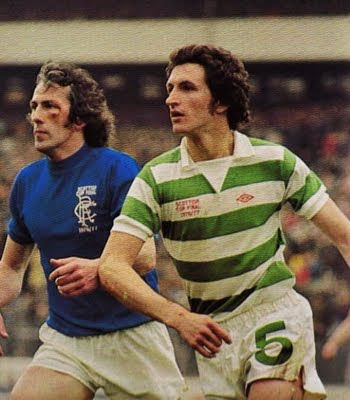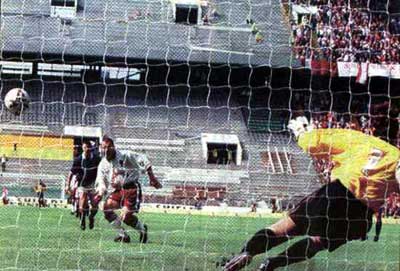
Tottenham v Glasgow Rangers - European Cup-Winners Cup 1962
The magical Hungarian side of the 1950's and the spellbinding quality of Real Madrid in the early 1960's opened the eyes of football supporters in Britain to just how fast the game was changing at the beginning of the swinging sixties. The emergence of the three European club competitions at this time was a mouth watering addition to the menu of a game already enjoying a post-war boom in popularity and the likes of Benfica, Inter Milan and Bayern Munich were about to become as equally famous as the Spanish giants from Madrid. Whilst the drawing of a big name from the continent would stir great excitement, equally as enthralling would be the pairing of two British teams in European competition. In the autumn of 1962 the names of Tottenham Hotspur and Glasgow Rangers came out of the hat for the second round of the European Cup Winners Cup and, with the Sixties still in their relative infancy, the tie was being touted as the match of the decade.
Tottenham Hotspur, suave and sophisticated, had a team oozing with class. Players like Jimmy Greaves, John White and Danny Blanchflower were already part of White Hart Lane folklore as was that redoubtable Scot Dave Mackay. The team which had created history by winning the League and Cup double eighteen months previously was regarded as one of the finest Spurs teams of all time and, although they were no longer League champions, they were hot favourites to make further progress in the competition.
Glasgow Rangers had also seen their League championship flag taken away from them by Dundee but they had fine players of their own such as Scottish internationals Jim Baxter, Ronnie McKinnon, Eric Caldow and Davie Wilson. Many observers, however, believed that Spurs - with some of their top stars earning a reputed £5,000 a year, more than double the top salary at Ibrox -had too much quality to be troubled by their Scots counterparts and the first leg at White Hart Lane kicked off on Halloween 1962 with the Londoners favourites to take a lead up to Glasgow.
Tottenham: Brown, Baker, Henry, Blanchflower, Norman, Mackay, Medwin, White, Allen, Greaves and Jones.
Rangers: Ritchie, Shearer, Caldow, Davis, McKinnon, Baxter, Henderson, McMillan, Millar, Brand and Wilson.
Predictably, thousands of Rangers supporters flocked to the capital to lend their heroes support and they were in good voice as the game kicked off. However, the pre-match predictions of a Spurs win seemed to be coming true with less than ten minutes on the clock. From a Greaves corner, White rose unchallenged above a transfixed Rangers defence to head Spurs into the lead.
The Ibrox men were stunned and more slack defensive play almost cost another goal shortly after. But, with Spurs threatening to run riot, Rangers winger Ralph Brand sent a sweeping pass to Davie Wilson 'who crossed for Willie Henderson to scramble the ball past Spurs Scottish goalkeeper Bill Brown. 1-1.
The match seemed to be living up to its billing as the game of the decade and in twenty-two minutes an audacious piece of skill by the ebullient Jimmy Greaves put Spurs back in front. With the Rangers defence remembering what John White had achieved from a previous corner kick, the Scotland star was tightly marked, but Greaves, the master showman, put such a curve on this corner that the ball sailed directly into the net past a startled Bill Ritchie in the Rangers goal.
This was the signal for all out Spurs pressure and the only surprise was that it took them until thirty-seven minutes to add to their score when Les Allen headed a Medwin cross powerfully home. Minutes later Allen added a fourth as the Ibrox defence began to crumble, although goalkeeper Ritchie kept the Glasgow side in the game with a string of fine saves. Yet, before the first half was over, the brave Scots had pulled another goal back - and it was a goal straight from the Spurs text book. A cross from Henderson on the right was headed gleefully into the net by Jimmy Millar. A breathtaking first half ended with Spurs 4-2 ahead.
The second strike had given Rangers heart and they started the second half on top, mounting a series of attacks on the Spurs goal. But, despite the pressure, they could not get the further breakthrough they needed and there were palpitations for the massed ranks of the Rangers support when Spurs won another corner with barely twelve minutes left. Inevitably Jimmy Greaves took it and Rangers worst fears were confirmed when Spurs centre half Maurice Norman guided the resultant cross past keeper Ritchie to make the final score 5-2 to the Londoners.
On the night of the original date for the second leg at Ibrox, Glasgow was enveloped in dense fog and so the game was put back. A massive crowd of more than 80,000 packed into Ibrox for the re-scheduled second leg on December 11th 1962 - a remarkable show of loyalty given that few people believed Rangers could beat Spurs from scratch, never mind three goals down. Rangers had controversially dropped midfield star Jim Baxter following the first leg at White Hart Lane but, wisely, had reinstated the international genius for the return game. Indeed the Rangers team was the same that lost heavily in London. Spurs only alteration was to replace Les Allen with Bobby Smith and the game kicked off in a cacophony of noise with both teams making early attacks.
With Rangers looking for the early breakthrough that would raise hopes of an unprecedented comeback, their aspirations were dealt a fatal blow from the man who was tormentor-in-chief in the first leg. As in that first game there were barely ten minutes gone. And, as in the first, it was Jimmy Greaves who was the hammer of the Scots. On a mesmerising run he went past one, two, three Rangers players as if they were not there. As goalkeeper Ritchie raced out, Greaves slipped the ball past him to put Spurs in front on the night and 6-2 ahead on aggregate.
You could have heard a pin drop at Ibrox. Rangers huffed and puffed for the rest of that first half but the class of this Spurs team was all too evident and they coped comfortably with anything that the Ibrox men could throw at them. In fact the closest to another goal came when Greaves nearly added a second after almost half an hour.Rangers did find a way through two minutes into the second half when Ralph Brand headed home a Willie Henderson cross and Ibrox erupted once more into a frenzy. However the joy was short-lived. Spurs merely moved up a gear once more when Bobby Smith made up for his absence in the first game by rocketing a shot past a bewildered Billy Ritchie to put his side 2-1 ahead on the night. It was a classic counter-attack and illustrated how much this Tottenham side had learned in such a short period of time about how to play the European way.
Rangers threw everything into attack once more, hoping to salvage some pride with an equaliser - for everyone knew the tie itself had been lost weeks earlier in London. With fifteen minutes to go Davie Wilson powered the ball past Bill Brown and it seemed that some respect was to be restored to the Scottish game with a 2-2 draw. But, being the true professionals they were, Spurs came forward again with just two minutes left. Again the Rangers defence got in a tangle and Bobby Smith got his second goal of the night to make the final score 3-2 for Spurs and a remarkable 8-4 on aggregate.The ovation given to both teams from a disappointed but appreciative Ibrox crowd told its own story.
Any Scotland v England clash, whether it be an international or a club match, raises the passion in any Scot but they knew by the way Tottenham had dismantled a Rangers side on its way to yet another League championship, they had witnessed an exceptional team in action. Tottenham, of course went on to destroy Atletico Madrid 5-1 in the Cup Winners Cup final in Rotterdam - but players and supporters alike would look back on the "Battle of Britain" with more than a little satisfaction.











